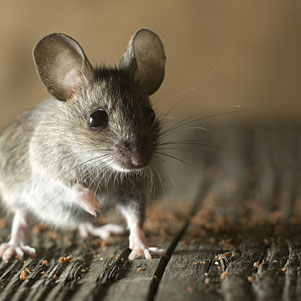 Many people think mice are cute – until they invade your home. Similar to other rodents, the presence of mice cannot always be sensed at first. However, as the temperature quickly drops, these animals look to come indoors, build nests and quickly breed.
Many people think mice are cute – until they invade your home. Similar to other rodents, the presence of mice cannot always be sensed at first. However, as the temperature quickly drops, these animals look to come indoors, build nests and quickly breed.
If you have a mouse problem, contact Eliminate ‘Em for same-day service!
How do you know mice are hiding in your home? Look for these signs.
1. Droppings
Before you see a mouse, you will see their droppings You may notice trails in your home and smell their urine.
Be warned that droppings are far more harmful than they sound. Mice become attracted to food and, in the process of consuming your goods or crops, they will leave droppings, urine and saliva behind. As mice may spread diseases, your food supply will likely become contaminated.
2. Shredding
Mice will build homes in boxes and crates. In the process, they will look for found materials – typically fabrics and paper – and shred it. If you start to see drapes, furniture and clothing with torn edges, rips or shredded bits, you may have discovered a mice problem.
3. You’ve Seen a Mouse
Seen one mouse? There’s likely to be more present and they will multiply in the future. These pests tend to hide and, as a result, breed quickly. A mouse can produce 10 litters in one year, then these mice start reproducing about two months later. Due to this fact, mice can be particularly difficult to exterminate on your own.
4. You See Small Holes
Are you noticing small holes on desks, drawers, cabinets and furniture? Mice like to gnaw, chewing through wood to make homes and create a pathway that allows other pests to enter.
5. You Hear Them
Much like other rodents, mice make scratching and squeaking sounds. Listen at night – there’s a chance you’ll hear this sound from inside your walls.
A mice infestation may quickly get out of hand, putting your health and safety at risk. At the first sign, contact Eliminate ‘Em for pest control services. We can be at your home the same day to assess your problem and rid your property of these pests.


